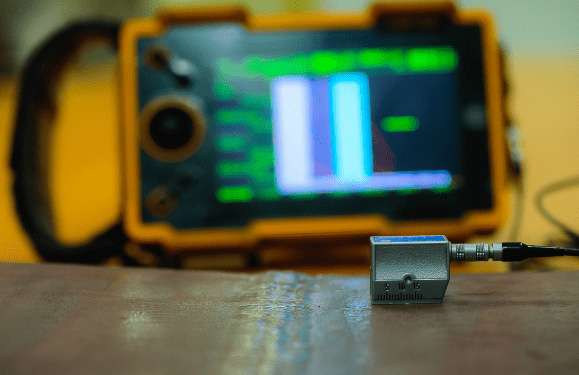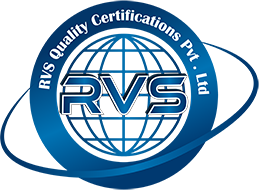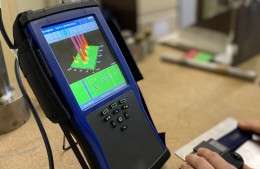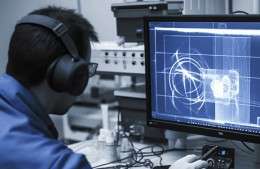I have been out of industrial activity after completing my graduation for about 2 years, then RVS Quality Certifications Pvt Ltd has changed my outlook on my career. Adopting a course in NDT has helped me launch my career.
Phased Array Ultrasonic Testing
- By: Admin

Phased Array Ultrasonic Testing (PAUT) is a nondestructive technique, which has been highly preferred in the inspection of materials, thickness measurement, and assessment of internal structural integrity. Unlike conventional ultrasonic testing, which typically uses a single transducer, this method employs a number of small transducer elements that can be electronically controlled and steerable using electric signals. The various angles at which the beam is steered are meant to create precise scans at different angles without moving the probe. This is as useful as conventional inspection would be in aerospace, oil and gas industries, manufacturing, and construction, and requires this technique to meet high safety standards. Phased Array Ultrasonic Testing offered by RVS Quality Certifications Pvt. Ltd. is very essential in minimizing accidents and complying with safety regulations by detecting any possible occurrence.
Related Topics: Phased Array and TOFD Training
Key Benefits of The Testing Method
It offers many advantages that make it the most favoured testing solution across the industries.
- High Accuracy and Dependability through Imaging: With PAUT, fine detail is in imaging for flaw detection, which could be cracks and voids in corrosion, and this reduces the likelihood of any false reading because it's a real time image as well.
- Make it Quick and Efficient: As opposed to old-fashioned systems to get the entire area involved, it gets into testing space within a shorter time and necessitates fewer scanning times. This reduces the downtime at industries while investigating for the well-being of safety.
- Improved Safety: The detection of faults within the internal structure of pipes, pressure vessels, the components of aircraft, and bridges prevents catastrophic failure, which forms an important part of risk management.
- Wide Applications: The application can be weld inspection, corrosion mapping, composite material testing, among other areas. This method can be applied in metals, plastics, ceramics.
Industries Relying on the Testing
It has a vast application in various industries that adopt it to keep operational and safety standards high.
- Aerospace Industry: Aircraft components are exposed to extreme conditions so structural integrity is key, and this technique ensures that fatigue cracks and material defects in fuselages, wings, and turbine blades are detected before they lead to minor failures that could endanger flight safety.
- Oil and Gas Sector: These are subject to extremely high pressures, as well as considerable environmental stresses. PAUT serves as an early detector of incidents such as corrosion, weld defects, and structural weaknesses to leaks and explosions within pipelines, storage tanks, and offshore drilling structures.
- Power Generation Plants: These include nuclear reactors, heat exchangers, and steam turbines, which require consistent checks to avoid structural failure. PAUT brings to light the possible weak spots before they become hazardous, thus ensuring plant efficiency and safety.
- Manufacturing and Construction: The weld joints, steel structures, and machinery components must be made durable enough to withstand the rigors of such industries. By adopting PAUT manufacturers ensure that their goods meet safety and quality standards before deployment.
Explore More- Phased Array Ultrasonic Testing See Beyond the Surface Benefits And Applications
How this Testing Improves Safety in the Long Run
Regular checks using PAUT check significantly towards long-term safety and operational reliability.
- Prevents Costly Failures: Early detection of material defects enables industries to address problems before they become serious cutting down costs in repairs and losses due to lack of production.
- Equipment Life Extension: For example, PAUT locates anticipated weaknesses, thus allowing for early maintenance to keep machinery and infrastructure in working order for longer.
- Minimizes Workplace Risk: The capacity for remote testing reduces the amount of personnel exposure to hazardous environments and provides a safer form of inspection.
- Ensuring the Compliance with the Safety Regulations: Most industries require periodic tests, which must be in accordance with legal as well as operational standards. PAUT is the tool that makes all this compliance possible for industries, saving them from penalties and damage to their reputation.
A Proactive Approach to Industrial Safety
In industries where the integrity of a structure is not negotiable, advanced inspection techniques are essential to prevent failure and ensure safety. Indeed, for bringing high precision, efficiency, and versatility, thereby becoming the widely accepted flaw detection method before any serious risk is posed, PAUT has been established today. Thus, investing in these modern forms of testing will guarantee a better future, even as it saves lives and property, and enhances the long-term reliability of operations. It is the instrument through which industries can work ahead of safety concerns and build a more secure future.
RVS is the absolute best value to learn Aerospace NDT Training Course to nurture my skills. I am completely satisfied with how affordable the service they provide. Thanks RVS Team for constant support.
I would like to thank RVS for their time and patience in helping me learn and grow with my NDT courses. I was able to work and learn at the same time, with no pressure. I would recommend RVS to anyone seeking to work and take courses at the same time. I accomplished the course and today I'm a Certified PCN Level II UT engineer.
RVS helped our new hires to acquire the comprehensive training they need, as well as for refresher courses for our current employees. This has worked well for us in obtaining the necessary NDT certifications.
Just a few lines to express my gratitude for your outstanding service over the past year. We would have no issue in referring to your organisation because of your customer devotion and professionalism.
NDT is employed in a wide range of industries, including oil and gas, aerospace, energy, power, nuclear, and transportation, with nearly endless career opportunities. A job in NDT is extremely dynamic, and ongoing training is required.
One of the advantages of a four-year NDT programme is that students can study in a more focused and instructive manner. For graduates, this offers up a plethora of new NDT employment options, including quality assurance, management, engineering design, research, NDT training, and teaching.
Non-Destructive Testing (NDT) Training Courses - Levels 1, 2 and 3.
The PCN (Personnel Certification in Non-Destructive Testing) is a programme that meets the BS EN ISO 9712 requirements for NDT technicians and supervisors. It is founded in the United Kingdom, but it has an impact on a number of countries in the European Union.








